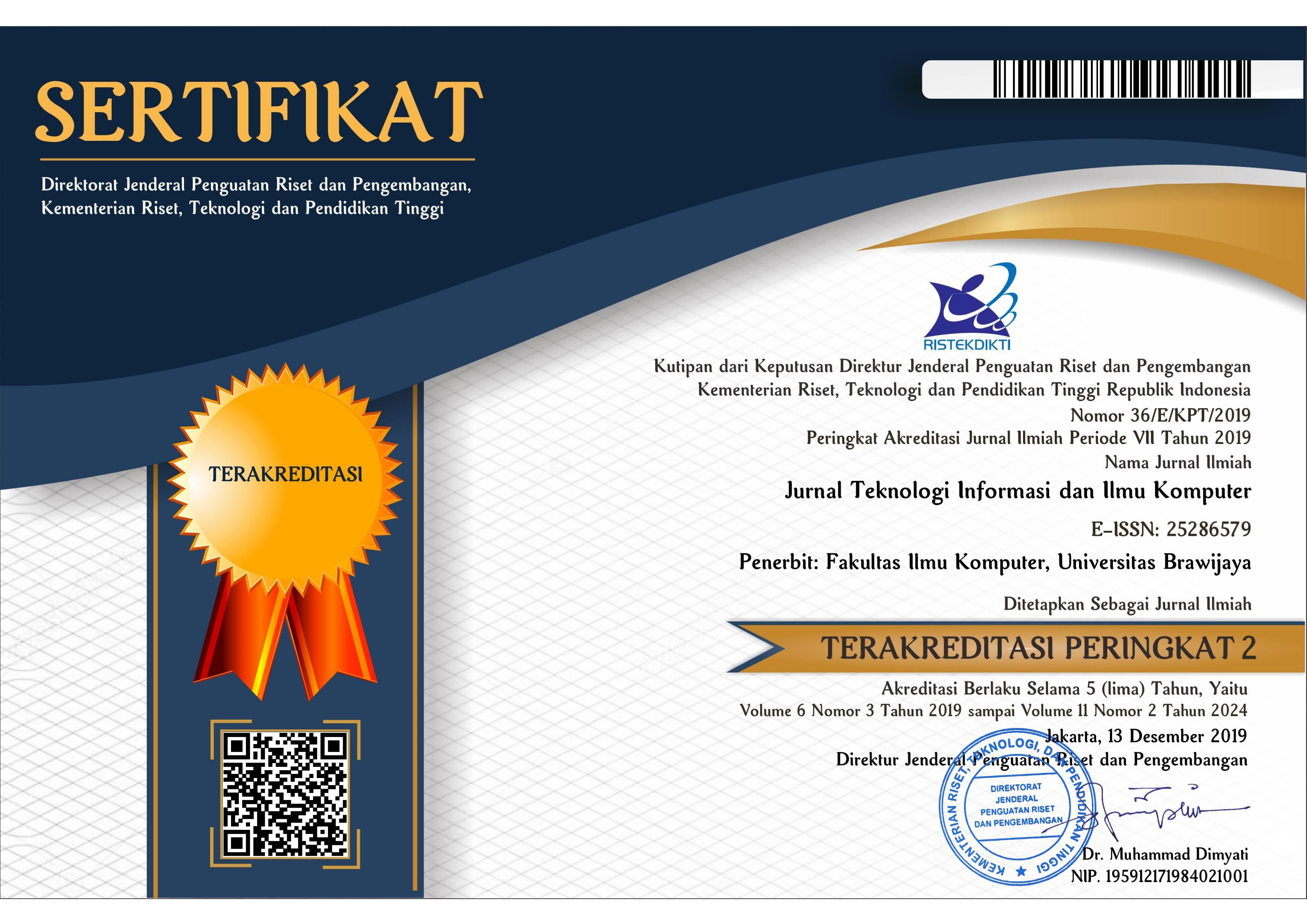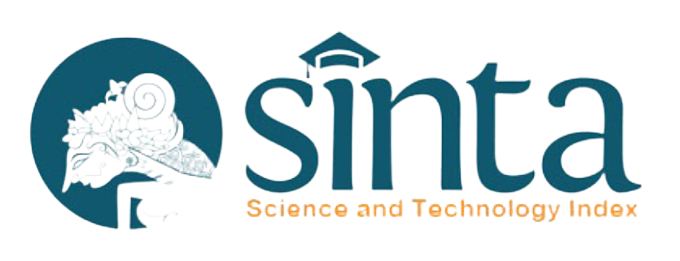Analisis Sentimen Multi-Aspek Berbasis Konversi Ikon Emosi dengan Algoritme Naïve Bayes untuk Ulasan Wisata Kuliner Pada Web Tripadvisor
DOI:
https://doi.org/10.25126/jtiik.2020731907Abstrak
Wisatawan seringkali mencari informasi tentang obyek wisata pada situs web seperti TripAdvisor. Situs web TripAdvisor memiliki fitur bagi penguna terdaftar untuk memberi ulasan tentang objek wisata dalam kategori kuliner dari berbagai negara. Ulasan tersebut bisa digunakan wisatawan sebagai pertimbangan sebelum mendatangi objek wisata kuliner yang ingin dituju. Komentar atau ulasan yang ada di situs TripAdvisor dapat dianalisis untuk mengetahui nilai sentimen dari suatu obyek wisata yang diulas. Hasil analisis itu dapat bermanfaat bagi pengelola tempat wisata, pengusaha kuliner maupun bagi wisatawan lain. Ada tantangan yang ditemukan saat analisis sentimen dilakukan pada kalimat ulasan yang mengandung ikon emosi atau emoticon, karena ulasan dapat mengandung arti sentimen yang berbeda antara kalimat dengan ekspresi emosi yang ada. Penelitian ini berisi analisis ulasan tentang kuliner kota Bandung pada situs TripAdvisor yang mengklasifikasi sentimen menjadi tiga kelas. Penelitian ini menggunakan teknik klasifikasi data mining dengan algoritme Naïve Bayes dikombinasi dengan metode pelabelan multi aspek yang disertai konversi ikon emosi pada teks ulasan. Selain itu, analisis dilakukan pada bobot ulasan berdasarkan jumlah kontribusi pemberi ulasan di web TripAdvisor. Hasil pengujian menunjukkan bahwa penggunaan seluruh kombinasi metode tersebut dalam proses klasifikasi sentimen mampu menghasilkan nilai akurasi sebesar 98,67%.
Abstract
Tourists often look for information about attractions on websites such as TripAdvisor. The TripAdvisor website has a feature for registered users to provide reviews about attractions in the culinary category from various countries. These reviews can be used by tourists as a consideration before visiting culinary attractions to be addressed. Comments or reviews on the TripAdvisor site can be analyzed to determine the sentiment value of a tourist attraction being reviewed. The results of the analysis can be useful for managers of tourist attractions, culinary entrepreneurs and for other tourists. There are challenges that are found when sentiment analysis is carried out on review sentences that contain emotion icons or emoticons, because reviews may contain different sentiment meanings between sentences and existing emotional expressions. This study contains a review of the culinary analysis of the city of Bandung on the TripAdvisor site which classifies sentiments into three classes. This study uses data mining classification techniques with the Naïve Bayes algorithm combined with a multi-aspect labeling method accompanied by the conversion of emotional icons in the review text. In addition, the analysis is carried out on the weight of the review based on the number of contributing reviewers on the TripAdvisor web. The test results show that the use of all combinations of these methods in the sentiment classification process is able to produce an accuracy value of 98.67%.
Downloads
Referensi
ABDILAH, A., MARDIYANI, E., & SAFUDIN, M. 2018. Integrasi Algoritma Genetika Dan Information Gaint Untuk Menganalisis Sentimen Review Hotel Menggunakan Algoritma Naive Bayes. Jurnal Teknik Komputer, 4(1), 186–193.
FANISSA, S., FAUZI, M. A., & ADINUGROHO, S. 2018. Analisis Sentimen Pariwisata di Kota Malang Menggunakan Metode Naive Bayes dan Seleksi Fitur Query Expansion Ranking. Jurnal Pengembangan Teknologi Informasi Dan Ilmu Komputer, 2(8), 2766–2770.
HIDAYAT, A. M. 2017. Klasifikasi Analisis Sentimen Menggunakan Algoritma Naive Bayes Pada Layanan Internet First Media. Universitas Budiluhur.
MARTANIA, T. D., ANISA, H., DANA, S. K., 2018. Multi-Aspect Sentiment Analysis Komentar Wisata TripAdvisor dengan Rule-Based Classifier (Studi Kasus : Bandung Raya). e-Proceeding of Engineering, Vol.5, No.1.
MENTARI, N. D., FAUZI, M. A., & MUFLIKHAH, L. 2018. Analisis Sentimen Kurikulum 2013 Pada Sosial Media Twitter Menggunakan Metode K-Nearest Neighbor dan Feature Selection Query Expansion Ranking. Jurnal Pengembangan Teknologi Informasi Dan Ilmu Komputer, 2(8), 2739–2743.
NAZIR, M. 2017. Metode Penelitian. Bogor: Penerbit Ghalia Indonesia.
RISCA PRATIWI, I. Y., ASMARA, R. A., & RAHUTOMO, F. 2017. Study of Hoax News Detection Using Naive Bayes Classifier in Indonesia Language. International Conference on Information & Communication Technology and System (ICTS), 73–78.
RUHYANA, N. 2019. Analisis Sentimen Terhadap Penerapan Sistem Plat Nomor Ganjil/Genap Pada Twitter Dengan Metode Klasifikasi Naive Bayes. Jurnal IKRA-ITH Informatika Vol 3 No 1 Maret 2019 ISSN 2580-4316
TRIYONO. 2018. Teknik Sampling Dalam Penelitian.[Online]Tersedia:https://www.researchgate.net/publication/324029597
Unduhan
Diterbitkan
Terbitan
Bagian
Lisensi

Artikel ini berlisensi Creative Common Attribution-ShareAlike 4.0 International (CC BY-SA 4.0)
Penulis yang menerbitkan di jurnal ini menyetujui ketentuan berikut:
- Penulis menyimpan hak cipta dan memberikan jurnal hak penerbitan pertama naskah secara simultan dengan lisensi di bawah Creative Common Attribution-ShareAlike 4.0 International (CC BY-SA 4.0) yang mengizinkan orang lain untuk berbagi pekerjaan dengan sebuah pernyataan kepenulisan pekerjaan dan penerbitan awal di jurnal ini.
- Penulis bisa memasukkan ke dalam penyusunan kontraktual tambahan terpisah untuk distribusi non ekslusif versi kaya terbitan jurnal (contoh: mempostingnya ke repositori institusional atau menerbitkannya dalam sebuah buku), dengan pengakuan penerbitan awalnya di jurnal ini.
- Penulis diizinkan dan didorong untuk mem-posting karya mereka online (contoh: di repositori institusional atau di website mereka) sebelum dan selama proses penyerahan, karena dapat mengarahkan ke pertukaran produktif, seperti halnya sitiran yang lebih awal dan lebih hebat dari karya yang diterbitkan. (Lihat Efek Akses Terbuka).















